|
|
|
Sort Order |
|
|
|
Items / Page
|
|
|
|
|
|
|
| Srl | Item |
| 1 |
ID:
093545
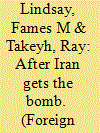

|
|
|
| 2 |
ID:
188126
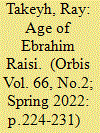

|
|
|
|
|
| Summary/Abstract |
The Islamic Republic of Iran finds itself in an unusual paradox. It is a regime that is growing stronger in the region while weaker at home. The mullahs will stand as Persia’s most dedicated and ardent imperialists, who have implanted their influence throughout the Middle East. Iran has prolonged regional civil wars, harassed Arab potentates, and reduced the once proud Arab nation of Iraq into a vassal state. Yet, it is at home that the regime faces its most significant challenges. Ebrahim Raisi, Iran’s new dogmatic and unimaginative president, is facing a depleted economy, popular protests, and massive corruption. The clerical oligarchs have no answer to Iran’s mounting problems. It remains unclear whether the regime can survive the many predicaments of its own making.
|
|
|
|
|
|
|
|
|
|
|
|
|
|
|
|
| 3 |
ID:
176178
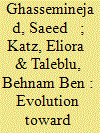

|
|
|
|
|
| Summary/Abstract |
Protests are a regular feature of life in the Islamic Republic of Iran. Using street power to push for incremental change or voice discontent with government policy, major protests in Iran have been closely identified with the country's reform movement. But from 2017 to the present, we posit that the aim of protests has drifted from reform towards revolution. We use the observable trend of change in geography, demography, violence levels, organization/cohesion, and slogans of protests to argue that the 2017 event was a change point: a structural break from reform to revolution. Drawing on the scholarship of Ted Robert Gurr and Alexis de Tocqueville on expectations for change and rebellion, we trace the structural and domestic political conditions that existed before 2017, and subsequently examine the five factors. We conclude with the impact this will have on future street protests in Iran and flashpoints for change.
|
|
|
|
|
|
|
|
|
|
|
|
|
|
|
|
| 4 |
ID:
138425
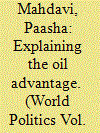

|
|
|
|
|
| Summary/Abstract |
Why does natural resource wealth prolong incumbency? Using evidence from parliamentary elections in the Islamic Republic of Iran, the author shows that natural resource revenues boost incumbent reelection rates because they are used to provide public or private goods to constituents, which incentivizes voters to reelect incumbents over challengers. To test this hypothesis, the author employs originally assembled data on five parliamentary elections in Iran (1992–2008) in longitudinal hierarchical regression analyses at the district and province levels. By leveraging Iran's mixed-member electoral system, he shows that the resource-incumbency mechanism works primarily in single-member districts with little evidence of an incumbency advantage for politicians in resource-rich multimember districts. Building on the rentier theory of natural resource wealth, the results suggest that voting for the incumbent is attributable to patronage and public goods distribution. The findings offer new insights into the understudied context of Iranian legislative elections, illustrate the mechanisms driving the relationship between resource wealth and incumbency advantage at the subnational level in a nondemocratic setting, and highlight the mediating effects of electoral institutions on the resource-incumbency relationship.
|
|
|
|
|
|
|
|
|
|
|
|
|
|
|
|
| 5 |
ID:
187549
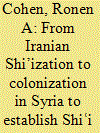

|
|
|
|
|
| Summary/Abstract |
In recent years, we have been witnessing the Islamic Republic of Iran’s process of Shi’ization in Syria and Iraq which has been labelled Al-tabshir al-shii or tashayu by prominent Arab and Muslim clerics. These include Yusuf al-Qaradhawi and Wahbe al- Zahili, a prominent Syrian Sunni cleric who saw this expansion as an aggression that ‘must be stopped’. In 2005 Abdallah II, the king of the Hashemite Kingdom, warned that the ‘Shi’ite Crescent’ circling Jordan from Khorasan in Iran all the way to Lebanon was expanding. The terms Al-tabshir al-Shii or tashayu describe this Shi’ization not only as a religious process but also as a process with geopolitical intentions – that is as an expansion of Shiʿi influence into lands, territories, and states. The main argument of this article is that Iran, with much help from the Syrian regime and Russia turning a blind eye, has been using the methods of colonization to settle Shi’ites in non-Shi’ite territories. Iran’s clear goal is to build a continuous land link between Iran, Iraq and Syria that will extend straight into the mainland of Lebanon.
|
|
|
|
|
|
|
|
|
|
|
|
|
|
|
|
| 6 |
ID:
115887
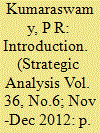

|
|
|
| 7 |
ID:
162641
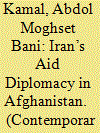

|
|
|
|
|
| Summary/Abstract |
This study aims at examining the Islamic Republic of Iran’s “aid diplomacy” officially referred to as “support diplomacy” and focuses on the Imam Khomeini Relief Committee (IKRC), a charity organization which is functioning as the main vehicle. The IKRC is highly active in many poor countries and this study focuses on the activities, strategies, and achievements of the IKRC in Afghanistan. The study among others finds that Iran is using rigorous aid diplomacy to penetrate into the downtrodden layers of Afghan society. The foundational principles of the IKRC suggest that this institution is functioning in the direction of Ayatollah Khomeini’s doctrine of “Exporting the Revolution.” In line with this, the IKRC is tasked to nurture Afghan sympathizers for the Islamic Republic of Iran to enhance this country’s soft power in Afghanistan and the relief efforts are heavily influenced by its official ideology that is based on Shia belief system.
|
|
|
|
|
|
|
|
|
|
|
|
|
|
|
|
| 8 |
ID:
151974
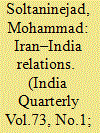

|
|
|
|
|
| Summary/Abstract |
With its enormous natural and human resources, a growing economy and adjacency to Iran’s security and strategic environment, India is considered one of the most important options with which the Islamic Republic of Iran can establish stable and reliable, if not strategic, relations. Despite this, all economic, trade and cultural capacities as well as diplomatic initiatives have not elevated the mutual relations higher than ‘cordial and friendly’. The present article discusses the reasons behind Indo-Iranian failure to create a once desired strategic partnership. The main idea is that differences in the direction and objectives of the relations between Iran and India, that is, balancing the United States for the former and cooperation with Iran besides the United States for the latter, have led to failure of the efforts to establish a strategic partnership. The theory of soft-balancing is used to analyse Iran–India relations when United States as a factor affecting bilateral relations is concerned.
|
|
|
|
|
|
|
|
|
|
|
|
|
|
|
|
| 9 |
ID:
112112
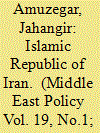

|
|
|
| 10 |
ID:
180029
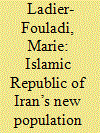

|
|
|
|
|
| Summary/Abstract |
After dropping rapidly and steadily over two decades, fertility in Iran stabilized between 2001 and 2011 at around 1.9 to 2 children per woman, before starting to rise slightly between 2012 and 2016, then falling fairly quickly. This coincided with the implementation of the Islamic Republic’s new population policy, with its aggressive and coercive measures, one of whose goals was to reverse the downwards trend in fertility. Given changes in proximate and remote determinants of fertility in Iran, and the decline in fertility since 2016, it is assumed that this new population policy triggered a reduction in intervals between births between 2012 and 2015, leading to a slight rise in the fertility of already married couples. The other latent objective of the Islamic Republic’s new population policy is to drive Iran’s population up to 150 million inhabitants in the near future. This is utopian given Iran’s demographic dynamics, but it conceals the political and ideological goal of asserting Iran’s demographic and geopolitical significance within the region, by drawing on a novel immigration policy to make up for its low fertility.
|
|
|
|
|
|
|
|
|
|
|
|
|
|
|
|
| 11 |
ID:
114431
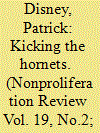

|
|
|
|
|
| Publication |
2012.
|
| Summary/Abstract |
This article applies the concept of nuclear ambivalence to the case of the Islamic Republic of Iran. Nuclear ambivalence differs from other approaches to understanding nuclear proliferation in that it focuses on the deeply misunderstood relationship between the two potential uses of nuclear power: energy and weapons. According to this theory, the civilian applications of nuclear technology cannot be separated from the potential military applications and vice versa. Ambivalence, therefore, extends into the realm of states' nuclear intentions, making it impossible to know with certainty what a potential proliferator's "true" intentions are. This article will demonstrate that the concept of nuclear ambivalence applies in the case of Iran, suggesting that current international nonproliferation efforts run the risk of encouraging rather than discouraging Iranian weaponization. The final section outlines recommendations for policy makers to reverse this counterproductive nonproliferation approach.
|
|
|
|
|
|
|
|
|
|
|
|
|
|
|
|
| 12 |
ID:
186825
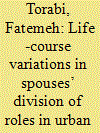

|
|
|
|
|
| Summary/Abstract |
Despite a growing acceptance of egalitarian gender attitudes, there is no empirical evidence about the division of roles between wives and husbands and its variation across their family life in the Islamic Republic of Iran (IRI). This paper uses data from the 2014 to 2015 Time Use Survey, representing urban areas of the IRI, to examine the dynamics of the spouses’ division of roles across their family life. The findings confirm a gender division of roles. The mapping of the spouses’ role behaviours during their family life provides a combination of gender similarities and differences. Role configurations (or role variations across family life) clearly differ between spouses but the pathways (or life-course variations in role behaviours) are quite similar in some roles (i.e., community, individual and parental roles) and different in others (i.e., occupational and domestic roles). To the extent that the existing gender patterns are perceived as unjustified, they can be consequential not only for marital satisfaction and quality, but also for marriage and childbearing decisions.
|
|
|
|
|
|
|
|
|
|
|
|
|
|
|
|
| 13 |
ID:
162528
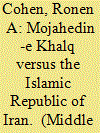

|
|
|
| 14 |
ID:
164747
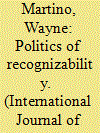

|
|
|
|
|
| Summary/Abstract |
In this article we examine accounts of self-identifying Iranian gay men. We draw on a range of evidentiary sources—interpretive, historical, online, and empirical—to generate critical and nuanced insights into the politics of recognition and representation that inform narrative accounts of the lived experiences of self-identified gay Iranian men, and the constitution of same-sex desire for these men under specific conditions of Iranian modernity. In response to critiques of existing gay internationalist and liberationist accounts of the Iranian gay male subject as a persecuted victim of the Islamic Republic of Iran's barbarism, we address interpretive questions of sexuality governance in transnational contexts. Specifically, we attend to human rights frameworks in weighing social justice and political claims made by and on behalf of sexual and gender minorities in such Global South contexts. In this sense, our article represents a critical engagement with the relevant literature on sexuality governance and the politics of same-sex desire for Iranian gay men that is informed by empirical analysis.
|
|
|
|
|
|
|
|
|
|
|
|
|
|
|
|
| 15 |
ID:
188440
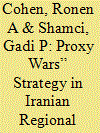

|
|
|
|
|
| Summary/Abstract |
The Islamic Republic of Iran’s efforts to export its revolution in the Middle East is quite old news. The largest regional conventional war in recent history was the Iran-Iraq War (1980–1988), which not only sharpened the historical enmities and hostilities between Arab-Sunnis and Persian-Shiʿi but also revealed Iran’s new foreign policy activism among the other Shiʿi communities in the Middle East – but not only them. This article argues that, after having failed to establish a pro-Iranian government in Iraq, Iran’s regional foreign policy, especially in the matters of managing its proxies and allies in its efforts to build a functional territorial corridor between Iran and Lebanon via Iraq and Syria, views the Syrian geographical region as the last important fortress it needs to complete this strategy. Even though Iran’s economic problems are acute because of decades of sanctions and isolation, Iran still invests billions of dollars in order to safeguard this bastion. The central argument of this work is that the tactical success that the proxies are presently providing for Iran and Syria has been limited to the very specific goal of preserving the Syrian regime since this is what has been enabling Iran to expand its regional stronghold. In terms of this being an effective long-term strategy, however, and despite Iran’s insistence that a proxy war is necessary, such a war benefits its rivals as well. This is because the strategy leads to Iran isolating itself even more in the region and to a loss of its territories of influence.
|
|
|
|
|
|
|
|
|
|
|
|
|
|
|
|
| 16 |
ID:
090388
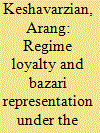

|
|
|
|
|
| Publication |
2009.
|
| Summary/Abstract |
The prevailing perception within the academy, policy circles, and the media inside and outside Iran has been that the members of bazaars are a unified social class engaged in a symbiotic relationship with the political elite of the Islamic republic and the conservative faction in particular. This approach is largely built on the perspective that there is a historic predilection for b?z?r?s and clerics to cooperate ("mosque-bazaar alliance"), and thus ideological compatibility and familial ties between the clergy and b?z?r?s have continued and developed into an alliance under the current regime headed by segments of the clergy. For instance, one of the leading experts on 20th-century Iran, Nikki Keddie, comments that, despite Mohammad Khatami's reformist agenda, "the ruling elite, who represent an alliance between the commercial bazaar bourgeoisie and conservative clerics, resist giving up their economic privileges as they do their political ones."
|
|
|
|
|
|
|
|
|
|
|
|
|
|
|
|
| 17 |
ID:
106083
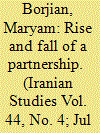

|
|
|
| 18 |
ID:
174832
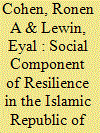

|
|
|
|
|
| Summary/Abstract |
This article examines the social components of national resilience as the source of the Islamic Republic of Iran’s ability to cope with possibly lethal blows and economic setbacks through four stages: (I) an account of the 1980–1988 Iran–Iraq War and the surprising outcome that left Iran undefeated, (II) a review of several theories that can aid us to analyze Iran’s national resilience ability, (III) an analysis of Iran’s wartime survival using the abovementioned theoretical infrastructure, (IV) a concise review of current issues in Iranian society which concludes with an evaluation of the state of Iran’s resilience regarding attacks on their nuclear program and its ramifications.
|
|
|
|
|
|
|
|
|
|
|
|
|
|
|
|
| 19 |
ID:
124966
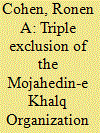

|
|
|
|
|
| Publication |
2013.
|
| Summary/Abstract |
While dealing with the human rights issue, the Mojahedin-e Khalq Organization (MKO), which used to be the main opposition group that fought the Islamic Republic of Iran (IRI), did not realize that this sensitive struggle would cost it a 'triple exclusion'. The MKO wished to use international agencies and diplomatic bodies, such as the European Union, the European Parliament, the UN and others, in order to raise the issue of human rights violations in Iran. In general, the aim was to topple the IRI by putting pressure on it through international sanctions and by gathering diplomatic support to replace the IRI with a democratic MKO government. The use of the human rights issue as a tool to gain support resulted in the opposite of what they wished. They became discriminated against by the IRI and excluded from the Iranian and international political spheres.
|
|
|
|
|
|
|
|
|
|
|
|
|
|
|
|
| 20 |
ID:
060678
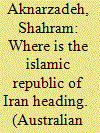

|
|
|
|
|
| Publication |
Mar 2005.
|
| Summary/Abstract |
The 'war on terror' has had significant repercussions for the Islamic Republic of Iran in both international and domestic arenas. In the international context, Iran is finding itself isolated. Gains made by the moderate leadership of President Khatami in normalising relations between Iran and the West appear to have been lost. In the domestic arena, the moderates seem powerless against the concerted advances of the hardliners, most evident in the February 2004 Parliamentary election.
|
|
|
|
|
|
|
|
|
|
|
|
|
|
|
|
|
|
|
|
|